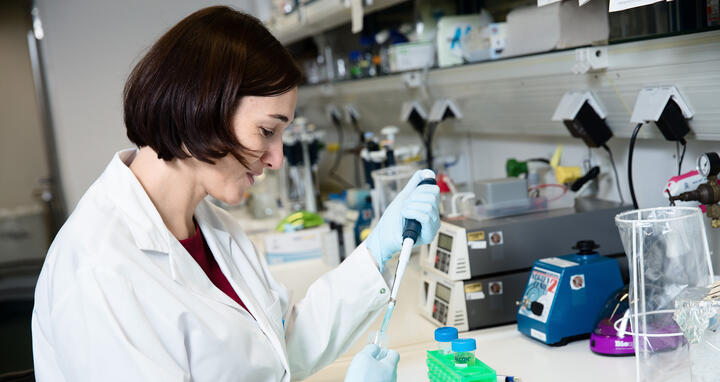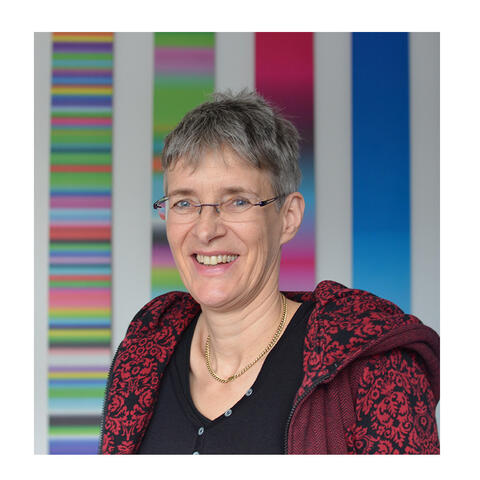More women at the top
About our “We at the MDC” series
The MDC aspires to provide all employees with an attractive work environment – through an outstanding infrastructure and through collaboration with leading researchers, but also by being a place where tolerance, respect, and good interpersonal relations are paramount. It doesn’t always succeed in equal measure at attaining these aims. Our series introduces you to people who are engaged in this field. It also sheds light on internal processes that seek to ensure a positive organizational culture. And it provides tips for an attentive togetherness.
Read more about the series “We at the MDC”.
Every young female scientist who works in research will ask herself sooner or later: Do I give everything I can to make a career in science? Or do I pursue a career path in another area, such as administration or industry?
The biologist Christiane Nolte was no exception. After completing her PhD in 1990 with Professor Melitta Schachner at the Institute for Neurobiology in Heidelberg, she initially entered a postdoc program in the pharma industry before joining Professor Helmut Kettenmann’s lab at the MDC in 1994. Both the research area and the pioneering spirit at the newly founded institute fascinated her. Things were going well for her – but the uncertainties associated with a scientific career, together with a difficult family situation and the prospect of possibly having to moving several times, still caused her to have doubts about her career decision. She and her family had settled down in Berlin and built a house, her husband had a steady job, and their daughter was still small. When she was offered the position of managing editor of the Journal of Molecular Medicine, a scientific journal published at the MDC, Nolte seized the opportunity. That was 2001. “In the final analysis, it was out of consideration for my family that I took this step – like probably most women who decide against a career as a scientist,” she says.
Dr. Christiane Nolte is MDC's Women representative since 2010.
“We’re losing too many talented women”
In addition to her work as editor, Christiane Nolte kept half a foot in science, continuing to coordinate projects in Helmut Kettenmann’s lab. Over and over again, she observed how promising early-career female scientists at the institute left research. “We’re losing too many talented women in the post-PhD phase,” says Nolte. The MDC Women’s Representative wants to change that. In 2010, she decided to run for this position and now devotes half her working time to women’s issues and the other half to neurobiology.
“I love my research activity, especially the work with young people,” Nolte says. She also provides counseling to women who stand at the same crossroads she once did – the crossroads where she decided against a scientific career: “I want to help women with potential who are pursuing promising research topics to build a career in science. We have to identify and remove the barriers that stand in the way of women accessing leadership positions,” says Nolte. “As an employer, the MDC must provide not only female scientists, but all its female employees with good qualification opportunities in an environment that supports gender equality. That, of course, includes policies that help women balance career and family. I want to provide constructive support to the MDC in these matters.”
An important part of her work is the mentoring program that was established at the MDC in 2001. Christiane Nolte and staff development officer Gabriele Kollinger jointly oversaw the program for many years; it has since been moved into the Postdoc Office. “We will also bring our experience to bear in the 9th round of the program, which is scheduled to begin soon,” says Nolte. Mentors from science or industry accompany the mentees – female postdoc scientists – for a year along their individual career paths. The personalized advice and workshops are designed to help the mentees recognize their own potential and take the next career step. The program has been open to men since 2018.
- The Equal Opportunities Act of the State of Berlin
-
-
The Equal Opportunities Act of the State of Berlin stipulates that every public institution in Berlin must elect a Women’s Representative. It requires institutions to ensure equal opportunities for women and men and actively empower women, prohibits discrimination, and calls for women to be appropriately represented at all levels – the Women’s Representative plays an active role in helping achieve these aims. Since the last elections in summer 2018, Christiane Nolte has been assisted in this task by a Deputy Women’s Representative.
Women lead less than 25 percent of MDC research groups
The MDC also has its own Gender Equality Plan, which calls for, among other things, increasing the proportion of women in scientific leadership positions to 27 percent by the end of 2020. Nolte pushed for updating the plan right at the start of her term because, as she puts it, “we must provide female scientists with equal career opportunities, and that can only be done if the Board of Directors implements the goals set by lawmakers.” Women make up more than half of PhD students at the MDC (62 percent*) and nearly half of the postdocs (46 percent), but then the numbers drop off sharply: Only 23 percent of research groups at the MDC are currently headed by women. In order to change that, the Women’s Representative is involved in the filling of senior positions and professorships. Nolte uses her office to monitor the appointment process and encourages the relevant committee to actively recruit suitable female candidates.
Many women who come to Nolte’s office have specific questions about funding and support opportunities. But more often the questions concern maternity and paternal leave, child care options at the MDC, or how to strike a better work-family balance. The issue of work-family balance is also of interest to male staff. “A technical employee wanted to extend his parental leave. I informed him of his rights and suggested strategies for winning over his superior,” Nolte recalls. “When we help fathers to be there for their families, that also contributes to women’s empowerment. We want to change stereotypical gender roles.”
More visibility for female scientists – including on Wikipedia
In addition to providing guidance and concrete assistance, Christiane Nolte is also working to raise the profile of women in science. “I encourage all senior female scientists to register with AcademiaNet. This database is used, among other things, to find proven experts or speakers for keynote speeches and also, of course, to recruit prospective candidates for professorships,” she says. Nolte also holds a lecture series that brings renowned female scientists to the MDC. It is not only about increasing their visibility and presenting outstanding research, but also about giving these women a platform as role models. This is because they often successfully organize not only their research, but also their family life. In the discussion following each lecture, early-career scientists can ask the researchers questions about their career path and get valuable tips. “When the topic of family comes up, there is one piece of advice frequently given by top female researchers: Find the right partner!” says Nolte.
An incident in 2018 showed once again just how under-recognized even top female scientists can be. When the Nobel Committee announced that it had selected Donna Strickland to receive the Nobel Prize for Physics – making her the third woman in history to win the prize – there wasn’t even a Wikipedia entry about her. The site’s editors considered her to be too insignificant. This matter strengthened Christiane Nolte’s resolve to pursue the idea of a Wikipedia event in collaboration with colleagues from the MDC, the Berlin Institute of Health (BIH), and Charité. On International Women’s Day 2019 they are planning to host an “edit-a-thon” at which participants will create biography pages for outstanding female scientists. A highlight will be the introductory talk by Dr. Jessica Wade of Imperial College London.
Taking greater account of gender differences in biomedical research
During the next few years, Christiane Nolte has a lot she wants to do as Women’s Representative. For one, she plans to advocate for a better integration of gender aspects in biomedical research. “We know there are gender-specific differences in disease expression and treatment. We therefore have to pay closer attention to this in basic research and differentiate between male and female in our experimental strategies, for example, in animal studies,” says Nolte. She also wants to work with the administration to examine whether there might be a gender pay gap at the MDC with regard to bonuses and allowances. The Transparency in Wage Structures Act, which entered into force in 2017, makes this possible. Unequal treatment has many facets.
*All figures are current as of the end of 2017.





